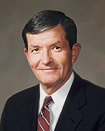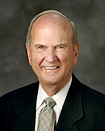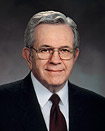Testimony, by Cecil O. Samuelson Jr.
Of the Seventy

Former students of Church universities may feel a certain affinity to the presidents that served while they were students. Depending on when they were enrolled, Elder Oaks (BYU 71-80), Elder Holland (BYU 80-89), Elder Bateman (BYU 96-03), or Elder Bednar (BYUI 97-04) may have a special place in former students' hearts. Such is the case for me with Elder Samuelson.
I entered BYU just as Elder Samuelson became its president. I thought it was fun that we started at the same time. While I was there, I had limited interaction with him, but I do have his signature on a couple of things (scholarship letters and diploma).
I studied civil engineering at BYU. Despite a background in medicine, Elder Samuelson accepted an invitation to give a guest lecture in an undergraduate fluid mechanics course (the semester after I took it). While he taught, he mentioned how excited he was for the opportunity to merge his professional training with his testimony. For the first time in years of teaching, he was able to share his testimony explicitly as he taught. He spoke of how the human heart is a pump, and blood flow is analogous to the flow of water studied in the course, and later shared his testimony in a powerful way.
I like Elder Samuelson. As I reviewed his most recent address today, I thought of the fluid mechanics classroom story and how he shared his testimony as I read a talk titled "Testimony." All while reading the words in his distinctive voice. (It made for a good lunchtime study session.)
As I thought of the message of the talk, I asked myself, "How can I help my children gain a strong testimony early before the times of struggle and distress set in?"
I found an interesting answer in the talk. Before I share the quote, I'll describe what I thought of. As Elder Samuelson compared a testimony to a living organism, I couldn't help but think of microorganisms—like bacteria. I imagined testimony meetings where the person speaking was trying to infect others (in a good way!). It gives sharing a testimony a new meaning altogether!
Okay, here's the quote:
A testimony is similar to a living organism that grows and develops when treated properly. It needs constant nourishment, care, and protection to thrive and prosper.

Perhaps it would have been better if I had thought of the testimony organism as something cute like a puppy, kitten, bunny, or hamster.

Okay, that's better!
Regardless of the comparative organism, a testimony needs care. As I'm helping to ensure that my children (they're organisms, too!) are growing and developing well, I need to provide an environment where their testimonies can likewise grow and develop.
Gaining a testimony is the result of choices. While I can't make that kind of choice for my children, I can help them by showing how my life and my testimony are influenced by my choices.
People do good and important things because they have testimonies. While this is true, we also gain testimonies because of what we do.










